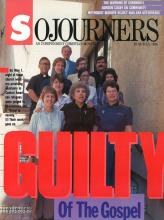JOHN FIFE had been pastor of Tucson's Southside Presbyterian Church for 17 years when this article appeared. —The Editors
Sojourners: What kind of experience has the trial been for you, and how do you feel about it?
John Fife: The trial has lasted six months, four days a week, in that courtroom. It's been a very technical legal process, and those of us who are not attorneys don't have a solid understanding of what has gone on. I've dealt with it, these long six months, by trying to be involved, trying to learn about the practice of law, and trying to understand the fine points of what the attorneys are doing and what they're thinking strategically. That's the way I've dealt with it emotionally and in terms of boredom, day in and day out, just sitting in that courtroom.
The most difficult part about it for me was to realize at the beginning that there was absolutely nothing I could do. The attorneys were going to take the case, and we were going to sit there. It's difficult, when people are playing with your life, to just sit and watch all the maneuvering and strategizing that goes on in that arena, to realize that you're just a spectator and you don't have any control over your life during the many months it's going to take for this to play itself out. It's hard to accept that somebody else is really going to make a determination that's going to profoundly affect your life. I'm not one who needs to be in control, but I'd sure like to be a player.
Read the Full Article
